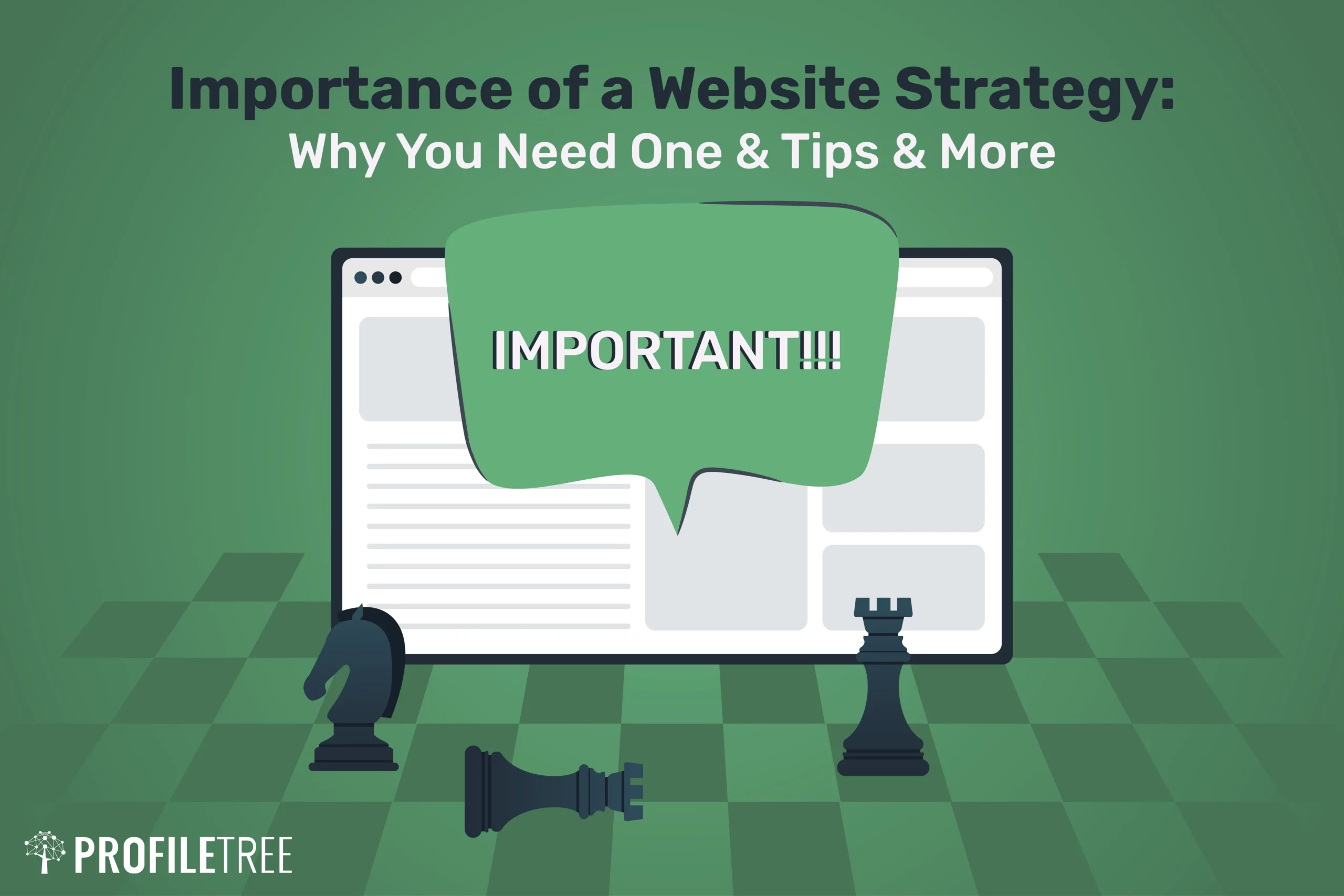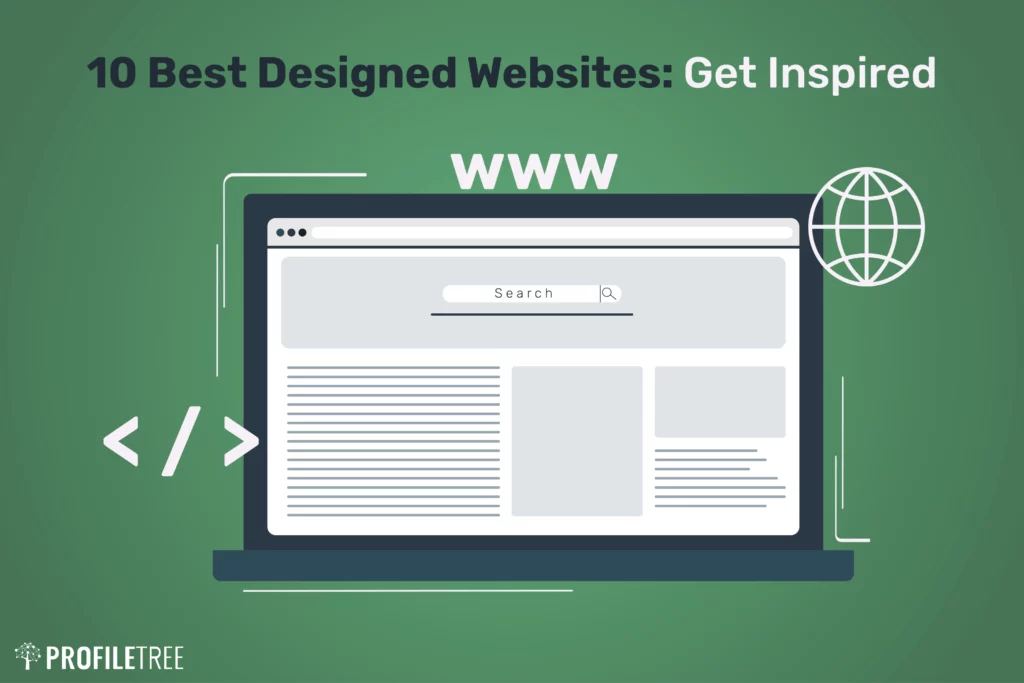The importance of a website strategy is priceless. Indeed, the success of your business is vastly dependent on how your marketing, social media, content, and website Strategies are executed, what comes out of them, and when you can build a new one.
The word “strategy” has always irked any business owner. It feels boring, stuffed with useless information and most of the time, you will leave it alone on a shelf where it will never be touched again.
Organisation startgey. Marketing strategy. Business strategy. Product Strategy. Strategy this. Strategy that.
Equally, many businesses take advantage of it. “Buy this strategy today and hit your ROI tomorrow!“ But, no, it’s a trap. Nothing works like that. You can not chalk a random strategy up to working with fortune.
Indeed, strategy is ubiquitous to any business, no matter what. But I’m sure you get tired of hearing this word. But, on the other hand, you absolutely observed misuse (or at least overuse) at one point and can show me some empathy.

Sometimes, a website strategy becomes notorious for using a useless approach to describe the first phase of a project with undocumented milestones and hazy deliverables with no formidable explanation as to why we even need one.
We know that because we offer website strategy services, and we notice how some of our clients fall short of these shortcomings. But you can stop these naive failures by taking time for a few blank stares from your actual customers and prospects.
Since we also provide website strategy services, we have seen firsthand how some of our customers fall short of this scope. However, these naive failures can be avoided by just spending a few hours to put a strategic action plan.
Learn what a website strategy should be and what steps to take along the way by reading this article and applying the advice it contains.
Why do You Need a Website Strategy?
The importance of a website strategy lies in having a site based on clear goals. It ensures your web design matches your identity. In addition, you will guarantee that web designers and developers can design and create an online appearance that works according to your business goals.
Not just that, here are ten reasons why you need to build a strategic website.
- A reference everyone can follow up: To cut off hassle when the picture becomes pale. It gives everyone a direction to trace to keep things meaningful. Because if there’s anything in your strategy that doesn’t add up (unclear or not outlined), your web designers and digital marketing partners won’t know the right outcome or performance metrics to deliver the best result. That will cost you more money in the long term.
- Your website goals are clear: It offers a guideline to explain your website goals. Having clear goals for your website allows you to focus on the areas that will lead to achieving those objectives— whether it’s increasing sales, driving more traffic, or simply providing helpful information about your business or organisation.
- A framework of your website design, content, and outline: It helps you plan, organise, and measure your online efforts’ effectiveness to make informed decisions about where to invest your resources.
- Know your resources: It will help you outline what you have and don’t, based on your research; then, you can direct your fund to the proper channels.
- Get inspired: the importance of a website strategy also includes getting inspired by other websites when searching and digging deeper into your competitors’ websites. You might explore a new category, tool, or style you can use.
- Identify any obstacles: It should also identify potential barriers preventing customers from achieving those goals—such as slow page loading times or poor navigational structure.
- Communicate your visual outcomes: Having a website strategy is critical to building a plan for every component of your website to achieve balance and consistency.
- Explain required web features: It helps your digital partners know what web features are essential for you to be included on the website so everyone will be happy with the outcome. Additionally, this will help with accurate costing based on what you need, essentially tied to key financial goals the site should deliver.
- Define ideal outcome: You will know the optimal result and how to get it.
- Create a performance-focused target: one of the importance of a website strategy is that it helps web designers accomplish their job with one goal in their mind, which will be explained in your plan. Then, they can create web pages relevant to each other, your business, and your target audience.
The Importance of a Website Strategy: Things You Should Consider
In this era, just building a website is not enough. You have to think deeply about what you have and how to optimise it. For example, you need to chew over the content plan to create, the terms you custom pages for, how your website is designed, and who your ideal audience is.
That’s what strategic planning is about.
You have to do research to help you produce a high-performance, target-driven website that meets your users’ expectations and gives them an exceptional experience.
Because customers who have a bad experience with your website will be 88% less likely to return, according to Forbes.
After all, that’s not a statistic you want to be part of.
Here we will share some facts about a website strategy because it’s not just about the importance of a website strategy; you need to avoid the wrong end of having a site for the sake of having it.
These are areas of web strategy you can’t afford to ignore when establishing your new site.
- Why You Want to Build a Website
Websites are typically approached as just portfolios or have a lifeless minimal copy. Many see having one as simply part of owning a business, yet not important beyond that.
No, it’s not!
Your website is the hub of your business. It’s where you make money, speak to your prospects, communicate with your audience, and grow your scop, and you have complete control over what you publish and how your message comes across.
Social media platforms will never give you that same freedom.
When creating your custom website strategy, you need goals or optimal outcomes for when visitors land on your website. Consequently, the website needs multiple goals to attract two types of customers, HARES & TORTOISES.
Yes, just like this childish story, and now it’s used extensively on the market, which will help you enhance your strategy when approaching your website.
So, what does it mean?
You need a plan A for all hares characters looking for a specific solution for their problem. Now, they’re ready to solve it.
The journey for those flocks needs to be clear, and you need to build trust so that they feel you are the best option for them when they reach out. Then, hares are more ready to book or buy.
When building your website strategy, you will typically include touching on specific pain points you can provide yourself as the solution. Remember that you need to make it super easy for them to make the purchasing decision or at least reach out to your website.
On the other hand, you will build a plan B for tortoises who might not be aware of the pain points they’re encountering or want more time to build trust and connection with your brand.
The importance of your website strategy now is to find ways for them to stay in your scoop so you have the opportunity to help them in multiple ways first, like a guide, an email list, a blog, or valuable social media content.
That leads us to…
- Create Awareness and Trust with Branding
Traffic is one of many concerns you should focus on.
Actually, you can drive traffic to your website but fail to transform these visitors into customers. The only way to generate conversions and build loyal customers is through branding. It creates an instant link in the minds of visitors and connects your potential customers with your offering.
Thus, branding is one of many strategies for developing a website that all can identify with. For example, consider the famous logo for Apple or the Nike motto “Just Do it.”
The importance of a website strategy is that it helps you build branding for your business.
Plus, the impact these images and words create and have on consumers directly communicates the impact branding can have.
- Who’re You Trying to Reach out to
You need to discover invaluable user behaviour and motivations that will entice them to engage with your website. That can be possible by conducting quantitative and qualitative research. To do so, you need to create motivate for your customers to share their thoughts with you.
You can rely on services like SurveyMonkey or conduct user interviews to outline the website user personas. These personas will finish it off by creating well-tailored marketing content. Not just that, this outcome is arguably the most valuable deliverable to all of your website strategies.
- What is Wrong With Your Current Website
A thorough analysis of your existing website (if applicable) is helpful to spot pain points within the user experience, peer into user interactions (aka conversions), and start tracking current SEO positioning.
It seems you have website analytics through Goole Analytics, right?
Study traffic patterns and translate them into valuable information. You can also run quantitative analyses such as scroll maps and heatmaps like what Hotjar produces.
- Build Your Website Map
You need to have a structure that shows how all web pages link together. It’s a web-based flowchart that will tell you more about your web goals and how you want your user to navigate through different pages.
Having this mapped-out chart from the outset is essential as designers understand your website strategy clearly.
A website map serves as a visual representation of the structure and layout of your website. Therefore, it is beneficial not only for your visitors but for you as well.
It helps you track which pages are linked together, what keywords should be used on different pages and where content should be placed. Furthermore, it will enable search engine crawlers to quickly scan through all your pages and understand what each page is about to rank them accurately in search engine results.
- Consider Stakeholders
The importance of a website strategy also emerges when it comes to stakeholders’ interests. This strategy enables you to perform stakeholder research to ensure that your site is built to help your team— and, of course, not just marketing.
Each team targets something different from the website and has valuable insights to share. For example, while marketing teams want to generate conversions from the website by asking developers to prioritise call-to-action placements and optimise page layouts for sales, overloaded customer service teams might ask for an FAQ page that eases their daily workload.
In today’s world, your website should cater for more than just generating leads— it should also consider customer service aspects and sales assistance. Building stakeholder research within your website strategy makes this possible.
- Build Connections
When building your website, you need to realise this harsh reality: a lot of small businesses are out there. So, what makes you different from all the others?
The answer is YOU!
Focus on building a connection and showing empathy and understanding for your visitor’s concerns. That’s how you can create a reason for someone to book and buy from you.
The importance of a website strategy is that it will keep visitors just landing on your website to explore more. Conversely, a website that lacks a strategy will watch people who just opened it leave immediately. And then you’ll lose your position in the long run.
As we mentioned before, solutions that address pain points are a great way to help the user know that you understand them.
That’s why your copy is critical in this stage and how it’s presented. Consequently, you want to strategise how you’ll break up your copy and in what order it will be given to best convey your message.
- Define the Key Services You Need on the Website
Outline essential services you need to reflect on the website. These services should appear on the home page— ideally, a sentence on each, and then you can create a unique page for each service to help your site perform better in search results.
When creating these pages, think of these services as things users will search for.
Indeed, creating effective and engaging service website pages is key to turning visitors into leads. With the right design and content, you can drive users towards taking action that will convert into leads for your business.
So, what can you do?
Firstly, make sure your page conveys the value of what you are offering. Clearly communicate why customers should choose your product or services over competitors. Secondly, use persuasive calls-to-action (CTAs) throughout the page; these should be easy to find and visible to lead potential customers down the funnel towards conversion.
- Translating Web Traffic into Sales
Building awareness through your website by driving traffic is one of many website strategies. The second half of the equation is to make a plan to convert that traffic into viable leads.
An effective website strategy is essential for lead conversion, and you have many examples and methods to do so, depending on the kind of product or service.
It varies between offering a free ebook for an email subscription or registration for a 10% discount.
However, you don’t have to reinvent the wheel to generate these lead magnets. This stage requires creativity to add value for your users.
If you don’t have the qualified resources to do this in-house or want to find out expert best practices, consider hiring freelancers or digital marketing services. Then you can reach out to writers and designers who can create and design a good ebook or webinar to attract and keep customers on your website.
How Can Profiletree Help You?
A well-executed web strategy can deliver several benefits for your business, such as better website project flow, increased traffic, higher conversion rates, and improved customer engagement.
By taking the time to develop this strategy early on and ensuring it’s performance-focused, you can double these benefits and see an increase in profits and business outcomes.
The importance of a website strategy is endless, and our team is aware of that.
At Profiletree, we believe in building high-performing sites on the strong foundations of a well-structured and strategic plan. We’ve found it provides better results for any business.
Your business success is our ultimate objective by taking all the necessary measures to make it a reality, from a situation analysis for your online presence to creating a required strategy.
And that’s what we’re here for. Our seasoned team can help enterprises adapt, thrive, and be ready with data-driven and cutting-edge digital tools.
Transform your website into your most marketing, valuable sales, and customer service tool. For more information, check out our growth and marketing services.
And if you have any questions about implementing or creating a growth-focused web strategy, please don’t hesitate to contact us. We would be happy to help!


